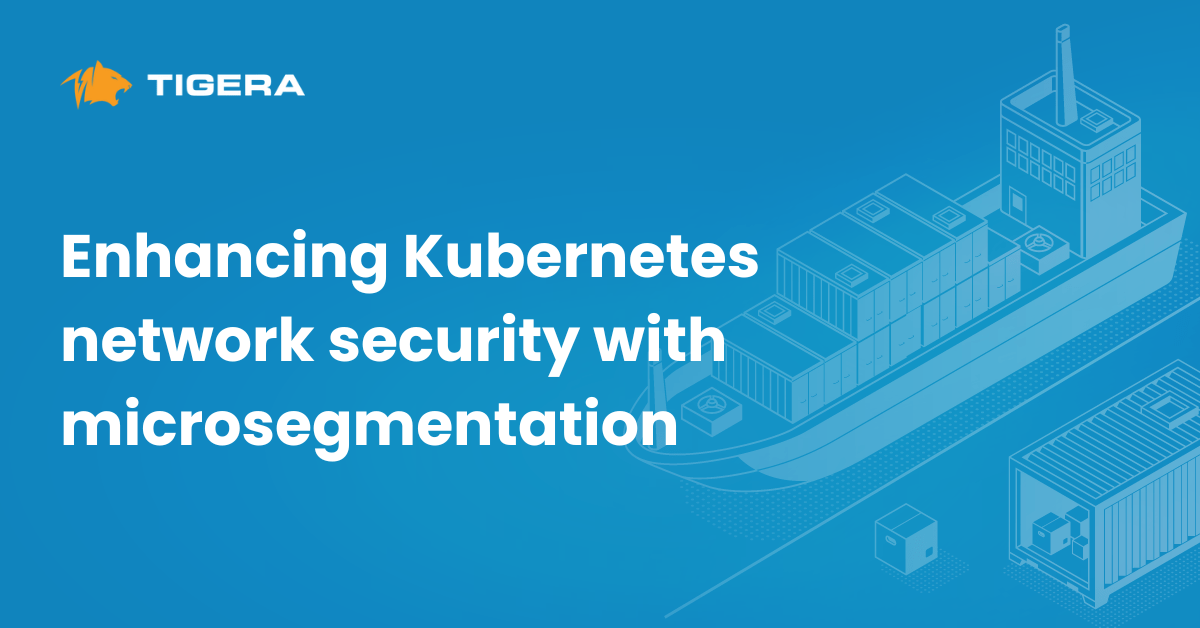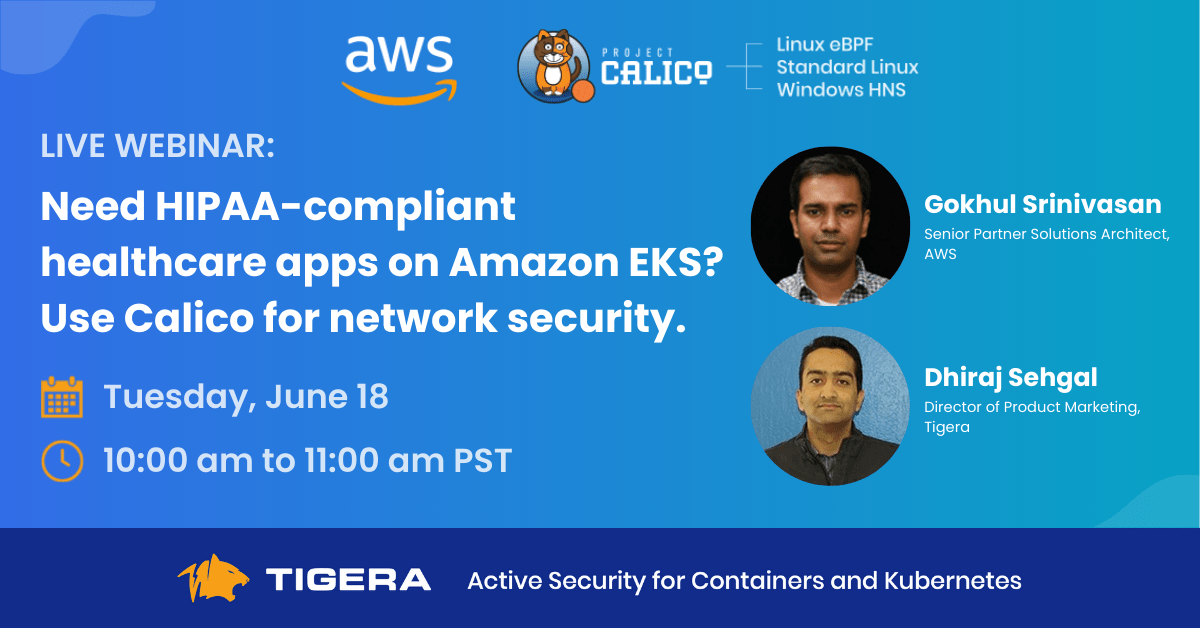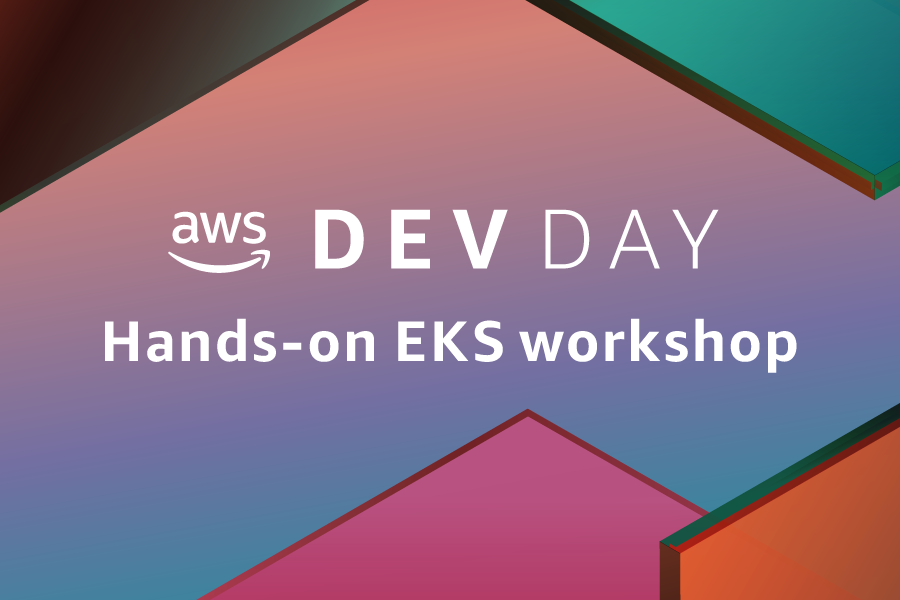Calico Enterprise
High-availability networking and simplified network security

Calico Enterprise provides high-availability networking and simplified network security for cloud-native applications. It enables simplified network security through more extensive network policies than are offered by native Kubernetes, rich policy tools, and policy deployment automation using GitOps practices.
Implement zero-trust workload access controls for traffic to and from individual pods to external endpoints on a per-pod basis, to protect your Kubernetes cluster. Author DNS policies that implement fine-grained access controls between a workload and the external services it needs to connect to, like Amazon RDS, ElastiCache, and more.
Limit the blast radius when a security breach results in an APT (advanced persistent threat) with identity-aware microsegmentation for both container and VM workloads. Use a single policy framework and Kubernetes declarative model to set controls at the host, container/VM, and application levels.
Extend the use of existing firewalls and SIEMs to your Kubernetes environment with out-of-the-box firewall and SIEM integrations.
Calico Enterprise protects your workloads at runtime from both known and zero-day threats.
Calico provides workload-based intrusion detection and prevention, deep packet inspection, protection from DDoS attacks, Envoy-based application-level protection, and WAF.
Calico Enterprise uses AlienVault and custom threat feeds to actively protect your containers from known malware and DGA attacks.
In addition, Calico Enterprise uses advanced machine learning techniques to detect zero-day threats by baselining signals from processes, file systems, system calls, and the network.
Calico Enterprise’s robust and highly performant security policy engine can alert, pause, quarantine, or terminate infected pods within milliseconds in multi-cloud and hybrid environments.
The Security Policy Recommender scans your environment and recommends policies for robust security.
If you’re working with sensitive data that falls under regulatory compliance mandates like PCI DSS, HIPAA, SOC 2, or GDPR, Calico Enterprise provides data-in-transit encryption with industry-leading performance, as well as compliance reporting for security policies and controls.
Distributed applications are very difficult to troubleshoot. Calico solves this problem by dynamically generating a Dynamic Service and Threat Graph, as well as providing a built-in, UI-driven troubleshooting tool that enables easy monitoring and troubleshooting for microservices.
The Dynamic Service and Threat Graph provides a rich set of information with Kubernetes context, including across which namespaces workloads are communicating, detailed DNS information, detailed logs for every flow in your cluster, and how security policies are being evaluated.
Dynamic Packet Capture is a self-service, on-demand tool for capturing and evaluating traffic for a specific pod or collection of pods based on secure user access. It allows you to monitor how microservices are behaving and interacting with each other at runtime.
Unified controls in Calico Enterprise enable security and observability across multi-cluster, multi-cloud, and hybrid environments, and provide a single pane of glass to ensure consistent application of security controls across both containers and VMs. Unified controls also reduce the complexity for DevOps teams running the clusters by supporting self-service security and CI/CD integration. Using “policy as code,” Calico Enterprise fully automates the cluster-wide, end-to-end policy deployment process including any necessary security changes.
Built on Calico Open Source, the most widely adopted networking and security solution for containers and Kubernetes, Calico Enterprise also supports third-party CNIs including EKS VPC, Azure CNI, and GKE to expand your choice of public cloud providers.
Enable developers, DevOps, and SREs to follow a simple workflow and generate security policies with minimal effort. Create your own security policies using policy tiers and customize permissions based on your organizational structure.
Calico ensures the policies in the left-most tiers are given precedence over those on the right. Tiers are a Kubernetes object, so you can control who can view/modify policies in specific tiers. Every change of record to tiers and policies is captured, enabling you or auditors to go back in time for review or troubleshooting purposes.
For cluster operators who need reliable, consistent connectivity to resources outside of the cluster as well as cluster nodes on different racks, Calico Enterprise’s dual ToR connectivity ensures high availability with active-active redundant connectivity planes between cluster nodes and ToR switches running BGP.
Calico Enterprise was designed from the ground up with a pluggable data plane architecture. Along with the standard Linux data plane, it includes a Windows HNS data plane and a high-performance eBPF (extended Berkeley Packet Filter) data plane, thus future-proofing your decision to deploy Calico Enterprise.

Microsegmentation represents a transformative approach to enhancing network security within Kubernetes environments. This technique divides networks into smaller, isolated segments, allowing for granular control over traffic flow and significantly bolstering...
Read more >
The use of Amazon EKS is becoming more prevalent in the healthcare sector for their healthcare application modernization. To ensure compliance with HIPAA’s privacy regulations, DevOps, SREs, and platform teams...
Watch here >
Attend this in-depth, hands-on security workshop with Calico and Amazon AWS experts to get insights into Kubernetes cluster traffic, workload interactions, and security policy enforcement. The 90-minute interactive lab comes...
Register here >